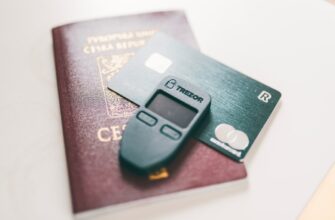🔐 USDT Mixer — Total Privacy for Your Crypto
Experience fast and secure USDT TRC20 mixing. 🌀
No accounts. No records. Just full anonymity, 24/7. ✅
Service fees start at only 0.5%.
With cryptocurrency thefts surging to $1.7 billion in 2023 alone, securing your digital assets has never been more critical. Hackers constantly evolve their tactics, making wallet security a non-negotiable priority for every crypto holder. This comprehensive guide reveals proven best practices to shield your crypto wallet from malicious attacks and ensure your investments remain under your control.
- Why Crypto Wallet Security Can’t Be Ignored
- Essential Best Practices to Fortify Your Wallet
- 1. Choose Your Wallet Wisely
- 2. Master Seed Phrase Protection
- 3. Enable Multi-Factor Authentication (MFA)
- 4. Implement Network Security Protocols
- 5. Maintain Digital Hygiene
- 6. Verify Everything Twice
- 7. Limit Exposure Through Diversification
- 8. Enable Transaction Whitelisting
- 9. Conduct Regular Security Audits
- 10. Prepare for Physical Threats
- Frequently Asked Questions (FAQ)
- Q: Can a hardware wallet be hacked?
- Q: How often should I update my wallet software?
- Q: Are paper wallets still safe?
- Q: What’s the first thing to do if I suspect a hack?
- Q: Is biometric security enough for mobile wallets?
Why Crypto Wallet Security Can’t Be Ignored
Crypto transactions are irreversible. Unlike traditional banks, there’s no fraud department to recover stolen funds. A single security lapse – whether through phishing, malware, or physical theft – can result in permanent loss of your assets. Implementing robust protection measures isn’t just advisable; it’s essential for anyone serious about cryptocurrency.
Essential Best Practices to Fortify Your Wallet
1. Choose Your Wallet Wisely
Not all wallets offer equal protection:
- Hardware Wallets (Cold Storage): Devices like Ledger or Trezor keep keys offline – immune to online attacks. Ideal for long-term holdings.
- Mobile/Desktop Wallets: Convenient for frequent transactions but require stringent security add-ons.
- Avoid Web-Based Wallets: Browser extensions and exchange wallets are prime hacker targets.
2. Master Seed Phrase Protection
Your 12-24 word recovery phrase is the ultimate key to your crypto. Protect it like your life depends on it:
- Never store digitally (no photos, cloud, or email)
- Use fire/water-resistant metal plates for physical backup
- Split phrases using Shamir’s Secret Sharing for added security
- Memorize it if possible
3. Enable Multi-Factor Authentication (MFA)
Go beyond passwords:
- Use authenticator apps (Google/Microsoft Authenticator) instead of SMS
- Consider hardware security keys like YubiKey for transaction signing
- Activate biometric verification where available
4. Implement Network Security Protocols
- Always use VPNs on public Wi-Fi
- Create a dedicated network for crypto transactions
- Disable Bluetooth/Wi-Fi when not actively trading
5. Maintain Digital Hygiene
- Update wallet software immediately when patches release
- Install antivirus with real-time crypto threat detection
- Use separate devices for trading versus daily browsing
6. Verify Everything Twice
Combat phishing with these tactics:
- Bookmark legitimate exchange URLs
- Double-check wallet addresses character-by-character
- Never click links in unsolicited “support” emails
7. Limit Exposure Through Diversification
- Spread assets across multiple wallets
- Keep only spending amounts in hot wallets
- Use separate wallets for different cryptocurrencies
8. Enable Transaction Whitelisting
Restrict withdrawals to pre-approved addresses only – available on wallets like Ledger and Trezor.
9. Conduct Regular Security Audits
- Monthly wallet permission reviews
- Check connected apps via Etherscan for Ethereum wallets
- Monitor transaction histories for anomalies
10. Prepare for Physical Threats
- Use decoy wallets with minimal funds
- Install home security systems
- Never disclose crypto holdings publicly
Frequently Asked Questions (FAQ)
Q: Can a hardware wallet be hacked?
A: While highly secure, hardware wallets aren’t invincible. Physical access attacks or supply chain compromises are possible but extremely rare. Always purchase directly from manufacturers.
Q: How often should I update my wallet software?
A: Immediately when updates are released. Developers constantly patch vulnerabilities – delaying updates leaves you exposed. Enable automatic notifications.
Q: Are paper wallets still safe?
A: Only if properly generated offline and physically secured. However, they lack transaction flexibility and are vulnerable to physical damage. Hardware wallets are generally superior.
Q: What’s the first thing to do if I suspect a hack?
A: Immediately transfer funds to a new secure wallet using a clean device. Then reset all passwords and revoke wallet permissions via blockchain explorers.
Q: Is biometric security enough for mobile wallets?
A: Biometrics add convenience but shouldn’t replace other security layers. Always combine with strong PINs and seed phrase protection.
Implementing these best practices creates multiple security layers that deter even sophisticated hackers. Remember: In crypto, you are your own bank. Regular vigilance and proactive protection ensure your digital wealth remains truly yours. Start securing your wallet today – before attackers choose it for you.
🔐 USDT Mixer — Total Privacy for Your Crypto
Experience fast and secure USDT TRC20 mixing. 🌀
No accounts. No records. Just full anonymity, 24/7. ✅
Service fees start at only 0.5%.








